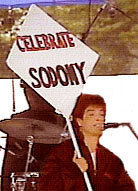y'all remember let's make a deal? remember when they'd have 3 doors.. and behind two of the doors is a goat.. and behind one is a car.... and so the person picks one.. then they open on of the doors with the goat.. and ask the person if they want to switch...
just in case you get on let's make a deal.. and you get this game.. take my advice.. and ALWAYS SWITCH... here's why:
Most people can readily understand that since you selected one of the three doors, if you stay, the probability of winning is 1/3. What happens if you switch? Assuming that the host always opens a door that does not have the car, and this is a crucial assumption, you have a 2/3 chance of winning if you switch.There are three equally likely possible orderings of the prizes behind the three doors, shown as A, B, or C.
..........................Original Door Selected............................
.......................... Door 1............ Door 2................ Door 3
Actual.....Order A...Car..............Goat.....................Goat
Situation..Order B..Goat............Car.......................Goat
................Order C..Goat............Goat......................Car
Suppose the player has selected Door 1. If the car is behind Door 1, as in order A, the host will open either Door 2 or Door 3, and if the participant switches, he or she will get a goat. If the car is not behind Door 1, as in order B or C, then the host will open the remaining door that has a goat, and if the player switches, he or she will get the car. Only order A would result in a loss, that is, a goat. This same analogy also works if you start with the player selecting Door 2 or Door 3. The probability that player wins a car with a switch is . = 2/3
just in case you get on let's make a deal.. and you get this game.. take my advice.. and ALWAYS SWITCH... here's why:
Most people can readily understand that since you selected one of the three doors, if you stay, the probability of winning is 1/3. What happens if you switch? Assuming that the host always opens a door that does not have the car, and this is a crucial assumption, you have a 2/3 chance of winning if you switch.There are three equally likely possible orderings of the prizes behind the three doors, shown as A, B, or C.
..........................Original Door Selected............................
.......................... Door 1............ Door 2................ Door 3
Actual.....Order A...Car..............Goat.....................Goat
Situation..Order B..Goat............Car.......................Goat
................Order C..Goat............Goat......................Car
Suppose the player has selected Door 1. If the car is behind Door 1, as in order A, the host will open either Door 2 or Door 3, and if the participant switches, he or she will get a goat. If the car is not behind Door 1, as in order B or C, then the host will open the remaining door that has a goat, and if the player switches, he or she will get the car. Only order A would result in a loss, that is, a goat. This same analogy also works if you start with the player selecting Door 2 or Door 3. The probability that player wins a car with a switch is . = 2/3


 Please Scroll Down to See Forums Below
Please Scroll Down to See Forums Below 











